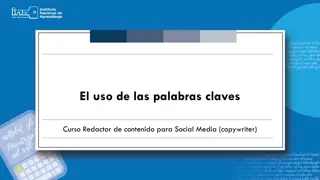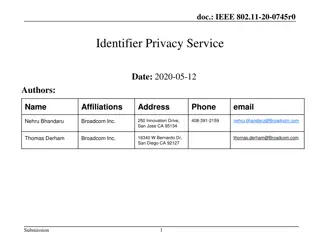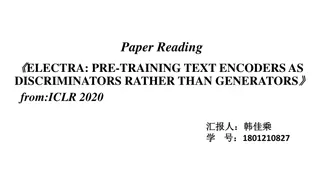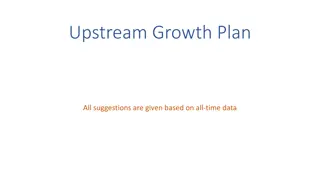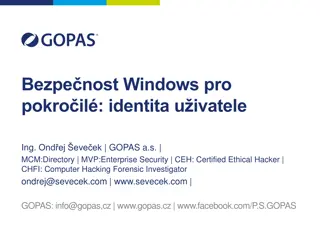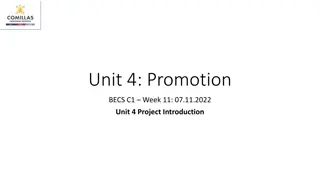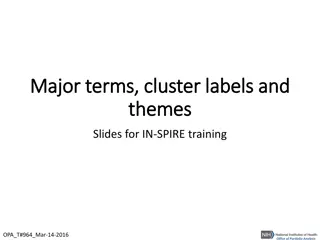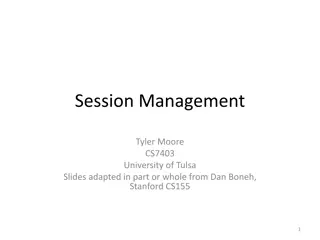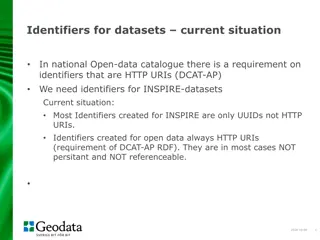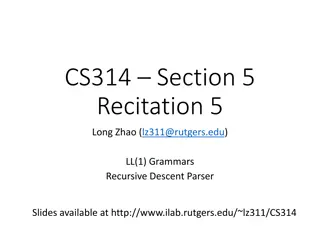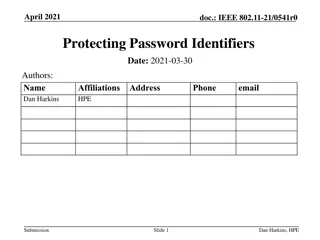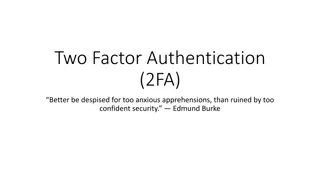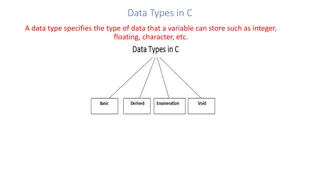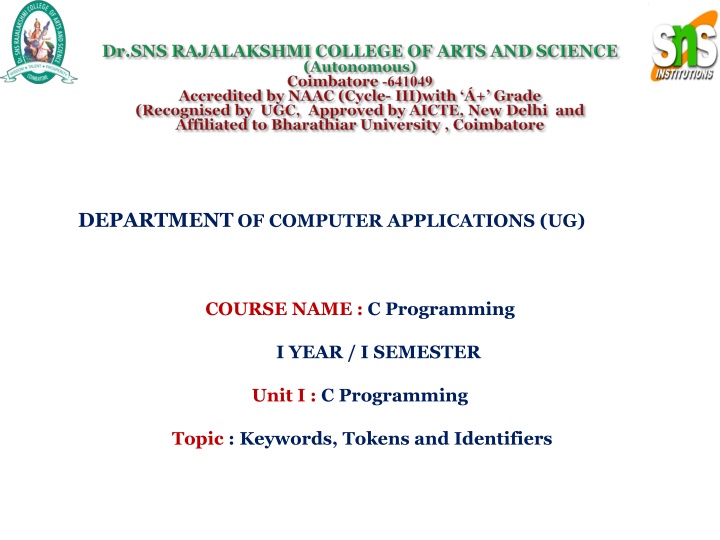
C Programming: Keywords, Tokens, and Identifiers
Dive into the fundamentals of C programming with a focus on keywords, tokens, and identifiers. Learn about the character set, C tokens, identifier naming rules, and more to solidify your foundation in C programming.
Download Presentation

Please find below an Image/Link to download the presentation.
The content on the website is provided AS IS for your information and personal use only. It may not be sold, licensed, or shared on other websites without obtaining consent from the author. If you encounter any issues during the download, it is possible that the publisher has removed the file from their server.
You are allowed to download the files provided on this website for personal or commercial use, subject to the condition that they are used lawfully. All files are the property of their respective owners.
The content on the website is provided AS IS for your information and personal use only. It may not be sold, licensed, or shared on other websites without obtaining consent from the author.
E N D
Presentation Transcript
DEPARTMENT OF COMPUTER APPLICATIONS (UG) COURSE NAME : C Programming I YEAR / I SEMESTER Unit I : C Programming Topic : Keywords, Tokens and Identifiers
Introduction A programming language is designed to help process certain kinds of data consisting of numbers, characters and strings to provide useful output known as information. The task of processing of data is accomplished by executing a sequence of accurate instructions called program. These instructions are formed using certain symbols and words according to some rules known as syntax rules. .
Character Set: The characters in C are grouped into following categories: 1) Letters 2) digits 3) special characters 4) white spaces. Compiler ignores white spaces unless they are part of a string constant.
LETTERS: Uppercase A .Z, lower case a..z. DIGITS: All decimal digits 0..9 SPECIAL CHARACTERS: comma(,), period(.), semicolon(;) , colon(:), question mark(?), quotation( ), dollar sign($), slash(/),back slash(\), percent sign(%), underscore(_), ampersand(&), asterisk(*), number sign(#). WHITE SPACES: Blank space, Horizontal tab, Carriage return, Newline, Form feed .
C Tokens C tokens are the basic buildings blocks in C language which are constructed together to write a C program. Each and every smallest individual units in a C program are known as C tokens.
C tokens are of six types. They are, Keywords (eg: int, while), Identifiers (eg: main, total), Constants (eg: 10, 20), Strings (eg: total , hello ), Special symbols (eg: (), {}), Operators (eg: +, /,-,*)
C Tokens Example Program: int main() { int x, y, total; x = 10, y = 20; total = x + y; printf ("Total = %d \n", total); } where, main identifier {,}, (,) delimiter int keyword x, y, total identifier main, {, }, (, ), int, x, y, total tokens
Identifiers in C Language: Each program elements in a C program are given a name called identifiers. Names given to identify Variables, functions and arrays are examples for identifiers. eg. x is a name given to integer variable in above program. Rules For Constructing Identifier Name In C: First character should be an alphabet or underscore. Succeeding characters might be digits or letter. Punctuation and special characters aren t allowed except underscore. Identifiers should not be keywords.
Keywords in C Language: Keywords are pre-defined words in a C compiler. Each keyword is meant to perform a specific function in a C program. Since keywords are referred names for compiler, they can t be used as variable name. C language supports 32 keywords which are given below. Click on each keywords below for detail description and example programs.
C Constant C Constants are also like normal variables. But, only difference is, their values can not be modified by the program once they are defined. Constants refer to fixed values. They are also called as literals Constants may be belonging to any of the data type. Syntax: const data_type variable_name; (or) const data_type *variable_name;
Types of C Constant: Integer constants Real or Floating point constants Octal & Hexadecimal constants Character constants String constants Backslash character constants
Rules for Constructing C Constant: 1. Integer Constants In C: An integer constant must have at least one digit. It must not have a decimal point. It can either be positive or negative. No commas or blanks are allowed within an integer constant. If no sign precedes an integer constant, it is assumed to be positive. The allowable range for integer constants is - 32768 to 32767.
Real Constants in C: A real constant must have at least one digit It must have a decimal point It could be either positive or negative If no sign precedes an integer constant, it is assumed to be positive. No commas or blanks are allowed within a real constant.
Character And String Constants In C: A character constant is a single alphabet, a single digit or a single special symbol enclosed within single quotes. The maximum length of a character constant is 1 character. String constants are quotes. enclosed within double
Backslash Character Constants in C: There are some characters which have special meaning in C language. They should be preceded by backslash symbol to make use of special function of them. Given below is the list of special characters and their purpose.
Backslash_ character Meaning \b Backspace \f Form feed \n New line \r Carriage return \t Horizontal tab \ Double quote \ Single quote \\ Backslash \v Vertical tab \a Alert or bell \? Question mark \N Octal constant (N is an octal constant) \XN Hexadecimal constant (N hex. dcml cnst)
How to use Constants in a C Program? By const keyword By #define preprocessor directive
Example Program using Const Keyword in C: #include <stdio.h> void main(){ constint height = 100; /*int constant*/ constfloat number = 3.14; /*Real constant*/ constchar letter = 'A'; /*char constant*/ constchar letter_sequence[10] = "ABC"; /*string constant*/ constchar backslash_char = '\?'; /*special char cnst*/ printf("value of height :%d \n", height ); printf("value of number : %f \n", number ); printf("value of letter : %c \n", letter ); printf("value of letter_sequence : %s \n", letter_sequence); printf("value of backslash_char : %c \n", backslash_char); }
value of height : 100 value of number : 3.140000 value of letter : A value of letter_sequence : ABC value of backslash_char : ?
Example Program Using #Define Preprocessor Directive in C: #include <stdio.h> #define height 100 #define number 3.14 #define letter 'A' #define letter_sequence "ABC" #define backslash_char '\?' void main() { printf("value of height : %d \n", height ); printf("value of number : %f \n", number ); printf("value of letter : %c \n", letter ); printf("value of letter_sequence : %s \n",letter_sequence); printf("value of backslash_char : %c \n",backslash_char); }
value of height : 100 value of number : 3.140000 value of letter : A value of letter_sequence : ABC value of backslash_char : ?
C Variable C variable is a named location in a memory where a program can manipulate the data. This location is used to hold the value of the variable. The value of the C variable may get change in the program. C variable might be belonging to any of the data type like int, float, char etc.
Rules for naming C Variable: Variable name must begin with letter or underscore. Variables are case sensitive They can be constructed with digits, letters. No special symbols are allowed other than underscore. sum, height, _value are some examples for variable name
Declaring & Initializing C Variable: Variables should be declared in the C program before to use. Memory space is not allocated for a variable while declaration. It happens only on variable definition. Variable initialization means assigning a value to the variable.
Declaring & Initializing C Variable: Type Syntax Variable declaration data_type variable_name; Example: int x, y, z; char flat, ch; Variable initialization data_type variable_name = value; Example: int x = 50, y = 30; char flag = x , Ch= l ;
There are three types of Variables in C Program They Are, Local variable Global variable Environment variable
Example Program for Local Variable in C: The scope of local variables will be within the function only. These variables are declared within the function and can t be accessed outside the function. In the below example, m and n variables are having scope within the main function only. These are not visible to test function. Like wise, a and b variables are having scope within the test function only. These are not visible to main function.
#include<stdio.h> void test(); int main() int m = 22, n = 44; // m, n are local variables of main function /*m and n variables are having scope within this main function only. These are not visible to test funtion.*/ /* If you try to access a and b in this function, you will get 'a' undeclared and 'b' undeclared error */ printf("\nvalues : m = %d and n = %d", m, n); test(); } {
void test() { int a = 50, b = 80; // a, b are local variables of test function /*a and b variables are having scope within this test function only. These are not visible to main function.*/ /* If you try to access m and n in this function, you will get 'm' undeclared and 'n' undeclared error */ printf("\nvalues : a = %d and b = %d", a, b); }
output values : m = 22 and n = 44 values : a = 50 and b = 80
Example Program for Global Variable in C: The scope of global variables will be throughout the program. These variables can be accessed from anywhere in the program. This variable is defined outside the main function. So that, this variable is visible to main function and all other sub functions.
#include<stdio.h> void test();int m = 22, n = 44; int a = 50, b = 80; int main() { printf("All variables are accessed from main function"); printf("\nvalues: m=%d:n=%d:a=%d:b=%d", m,n,a,b); test(); } void test() { printf("\n\nAll variables are accessed from" \ " test function"); printf("\nvalues: m=%d:n=%d:a=%d:b=%d", m,n,a,b); }
output All variables are accessed from main function values : m = 22 : n = 44 : a = 50 : b = 80 All variables are accessed from test function values : m = 22 : n = 44 : a = 50 : b = 80
Difference Between Variable Declaration & Definition In C: Variable declaration Variable definition Declaration tells the compiler about data type and size of the variable. Definition allocates memory for the variable. Variable can be declared many times in a program. It can happen only one time for a variable in a program. The assignment of properties and identification to a variable. Assignments of storage space to a variable.

